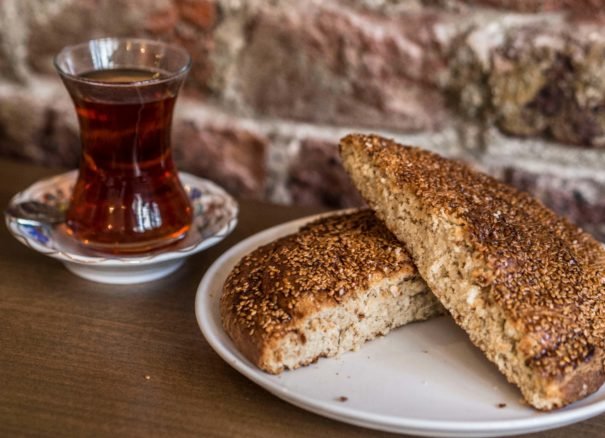
Romance is Fleeting But Pastry is Forever

Romance is Fleeting But Pastry is Forever
Tahinli çörek in Istanbul
Not long after I moved to Istanbul, I met a neighborhood, a guy, and a pastry all within a few months of each other.
The neighborhood was Kuzguncuk, a little village of a place that abuts the Bosphorus on the Asian side. Plane trees line its central avenue, and there are cafes and galleries and butcher shops and tea houses all in a row.
The guy was a resident of Kuzguncuk. It was to learn more about the history of this intriguing place, where minorities had coexisted well into the 20th century, that I met him through a mutual friend. He lived in an apartment he’d inherited from his mother, his parents having come like so many others from the Black Sea to settle in this part of Istanbul when it was first emptied of the Greeks, Armenians, and Jews that used to live here. We met in a tea house and chatted.
It was a chance encounter that turned into an hours-long conversation and ended with the gift of a book. We kept in touch and continued to meet not infrequently and usually over quite ritualized meals in meyhanes that might start in the early evening and go well into the early morning. But it wasn’t until the first snows fell and what Orhan Pamuk describes as the hüzün, or melancholy, of winter settled on the city that this friendship turned to something more.
Then I met the pastry.
It was morning, and he had put on a pot of coffee and popped out to buy a newspaper. He came back with package from Dilim Bakery on the corner, with something inside that looked like a snail in pastry form. It wound out from the center, was caramel-colored and dusted with sesame seeds. In texture, it was a hybrid between cake and bread, and inside were fine layers of tahini cream. It was an amalgam of sweet, nutty, and spicy, and a great complement to the black coffee. In Turkish they call it tahinli çörek and in Greek tahinopita.
This became our usual weekend breakfast, and whenever I left Kuzguncuk, I would walk down to Dilim Bakery on the corner and pick up a couple of the tahini pies for the road.
Summer came, and the guy and I broke up, and the pastry and neighborhood fell out of my life for a time. Then I tried buying it from other bakeries in my area, but they were not quite as good as the one in Kuzguncuk. So after some months, I started going back to Dilim Bakery. They know my face now, and we speak Turkish together.
The second year in Istanbul brought more visitors, and I kept sharing this pastry. My friends from Paris especially loved it, as surprised as I was at first by how flavorful it is, given its unprepossessing appearance. When they left, they even took some of the tahinli scones back to Paris with them, as I do when I visit, and my friend now tells me that tahinli is part of his apartment code.
Ideas and culture are spread, and food is a repository for memories. In spite of loss, we keep and pass on what we love, as bittersweet as tahini pastry and black coffee.